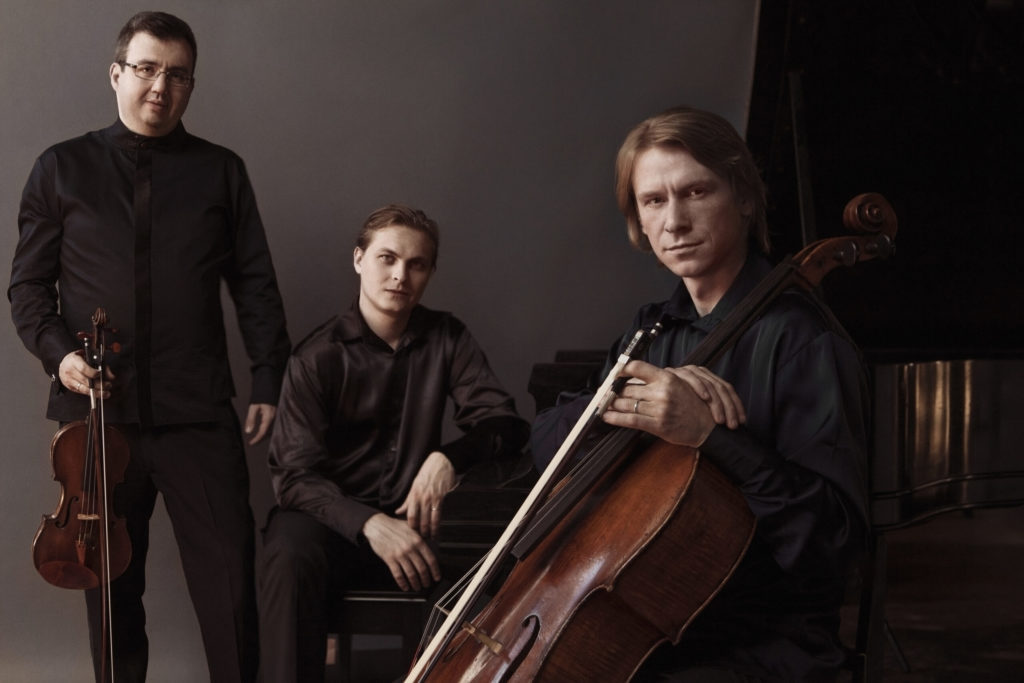Hermitage Piano Trio brings idiomatic fervor to Russian music

The Hermitage Piano Trio performed Tuesday night in Coral Gables, presented by Friends of Chamber Music.
The Hermitage Piano Trio made an auspicious debut last season for the Friends of Chamber Music. On Tuesday night, the three Russian-born musicians returned but this time they played in the more intimate space and transparent acoustic of Coral Gables Congregational United Church of Christ. With the musicians seated on audience level, the program took on the aura of a sophisticated salon. Once again Russian music provided this group’s with their strongest performances
.Each of the three stellar players have distinguished themselves as soloists. While they evidence distinctive individual sonorities and timbres, their ensemble playing is well coordinated and finely blended.
If there is one star of this threesome, it is cellist Sergey Antonov. Antonov was the youngest cellist to ever win the Gold Medal at Moscow’s Tchaikovsky Competition in 2007. From his first entrance in the opening work, Rachmaninoff’s Trio élégiaque No. 1 in G minor, Antonov’s tonal depth and aristocratic phrasing was impressive, unique in timbre and attuned to the score’s idiom.
This trio is a student work that was not published in the composer’s lifetime. Yet its impassioned, brooding character is quintessential Rachmaninoff, deeply steeped in the artistic ethos of Imperial Russia. Playing the keyboard line with broad, emphatic momentum, Ilya Kazantsev proved a master of Rachmaninoff’s romantic angst-ridden melodic pages. Violinist Misha Keylin’s silvery tone and intensity of projection crowned a reading that emphatically delved into the score’s moody heartbeat.
Keylin told the audience that Dmitri Shostakovich penned his Piano Trio No. 2 in C minor, Op. 67, during the height of World War II when Russia was attacked by the forces of Nazi Germany. He noted the irony that today, another nation—Ukraine—has been the victim of an unprovoked attack, this time by Russia. Keylin stated that he and his two colleagues have been fortunate to live in the United States.
The atmosphere of war, fear and defiance hangs over Shostakovich’s trio. The soft, high harmonics of the solo cello in the work’s opening bars suggest a pensive calm which is shattered by a dance-like motif from the piano. The movement ultimately turns dissonant and searing. The artists’ projection of darkly poignant undercurrents seemed to come from the most despairing soulful depths.
Shostakovich is at his most unhinged in the Allegro con brio. Playing with relentless abandon, the trio emphasized Shostakovich’s off-kilter accents, delivering the torrential rhythms at full throttle.
The piano’s first chords in the Largo portend stark tragedy. Kazantsev’s power, abetted by Keylin and Antonov’s emotional playing, rose to an overwhelming and moving climax. Against plucked strings, the piano introduces the Judaic-inflected melody of the finale. This bizarre dance of death was given steely force by Kazantsev. The group’s fiery traversal faded to near inaudibility in the coda. Shostakovich’s wartime opus has rarely been played with such fervor and conviction.
Just as the Hermitage players’ Russianized traversal of Ravel’s Piano Trio last season was less than attuned to that score’s Gallic ambience, their version of Mendelssohn’s Trio in C minor, Op. 66 was more gauged to Hugh musical voltage than the composer’s innate lyricism. The first movement may have set a speed record but it was undeniably exciting with Kazantsev’s hands a blur across the keys. They captured much of the warmth of the Andante espressivo before a Scherzo more brisk than airy. Robust articulation marked the finale’s coda while the movement’s contrasting episodes were accorded a greater measure of breadth and space.
Following repeated standing ovations, the trio offered Enrique Fernández Arbos’s sultry Habanera No. 1 as a charming encore.
Friends of Chamber Music presents pianist Benjamin Grosvenor 8 p.m. March 10 at Florida International University’s Wertheim Performing Arts Center. The program includes the Bach-Busoni Chaconne in D minor, Schumann’s Fantasy in C Major, Ravel’s Le tombeau de Couperin and Prokofiev’s Sonata No. 7. miamichambermusic.org
Posted in Performances
Leave a Comment
Wed Feb 22, 2023
at 10:27 am
No Comments






